On July 22, 2025, Ukraine’s Parliament passed legislation that significantly reshapes the accountability and governance model of the National Anti-Corruption Bureau (NABU) and the Specialized Anti-Corruption Prosecutor’s Office (SAPO). The vote marked a clear shift by the parliamentary majority toward tightening control over key elements of the country’s anti-corruption infrastructure. Lawmakers from across most parliamentary groups—some of whom had previously championed the independence of anti-corruption bodies—backed the bill.
In the public arena, the move is already being compared to governance tactics seen in the early 2010s. The decision was adopted with minimal debate, little involvement from specialized committees, and no clear explanation from legislators or the government—highlighting a broader trend: a drift toward pushing through sensitive measures without procedural transparency or public justification.
Most of the lawmakers who supported the bill did not publicly express their position on the vote. A review of their personal social media pages revealed that over 200 MPs—many of whom regularly report on their activities—either failed to mention the events of July 22 altogether or posted only formal updates without clarifying their role in the vote or their personal stance on the decision (e.g., Perebyinis, Vatras). Notably, posts celebrating Oleksandr Usyk’s victory appeared far more frequently than any mention of the July 22 vote. In the comments under these posts, voters asked questions regarding support for the bill, expressed criticism, or requested an explanation of motives—MPs’ responses were rare. In their replies, some lawmakers referred to the Constitution (see, for example, comments on D. Maslov’s post) without specifying how the legal status of NABU and SAPO allegedly conflicted with constitutional provisions.
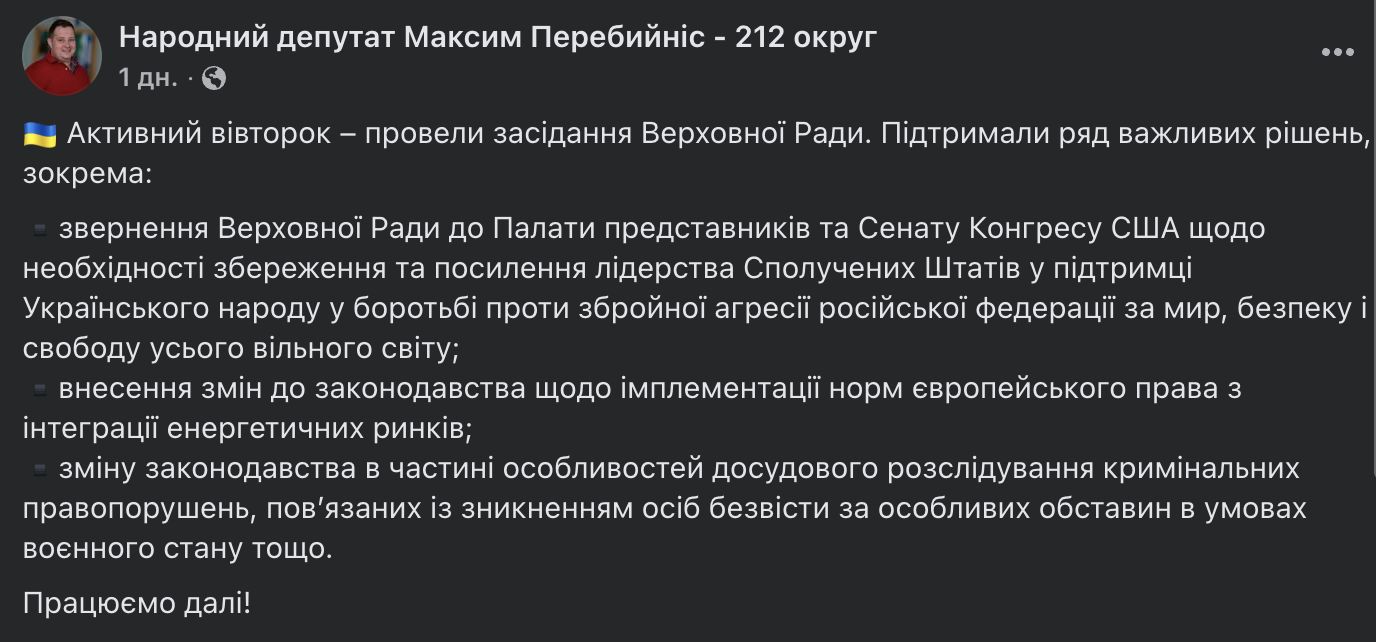
Translation:
“MP Maksym Perebyinis
An active Tuesday—we held a session of the Verkhovna Rada. We supported a number of important decisions, including:
*The Verkhovna Rada’s appeal to the House of Representatives and the Senate of the U.S. Congress regarding the need to maintain and strengthen U.S. leadership in supporting the Ukrainian people in their struggle against the armed aggression of the Russian Federation for peace, security, and the freedom of the entire free world.
*Amendments to legislation concerning the implementation of European law norms for the integration of energy markets.
*Changes to legislation regarding the specifics of pre-trial investigations of criminal offenses related to the disappearance of persons under special circumstances during martial law, among others.
We keep working!”
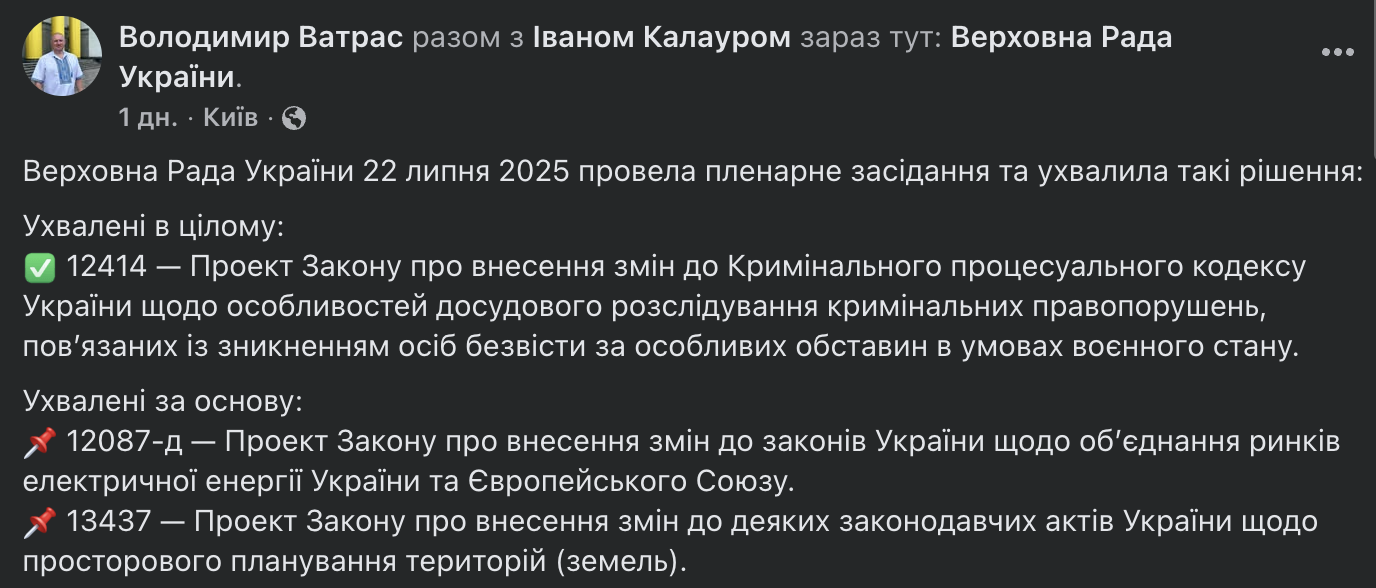
Translation:
“Volodymyr Vatras
On July 22, 2025, the Verkhovna Rada of Ukraine held a plenary session and adopted the following decisions:
Adopted completely:
12414—Draft Law on Amendments to the Criminal Procedure Code of Ukraine regarding the specifics of pre-trial investigation of criminal offenses related to the disappearance of persons under special circumstances during martial law.
Adopted in the first reading:
12087-d—Draft Law on Amendments to the Laws of Ukraine regarding the integration of Ukraine’s and the European Union’s electricity markets.
13437—Draft Law on Amendments to Certain Legislative Acts of Ukraine on Spatial (Land) Planning.”
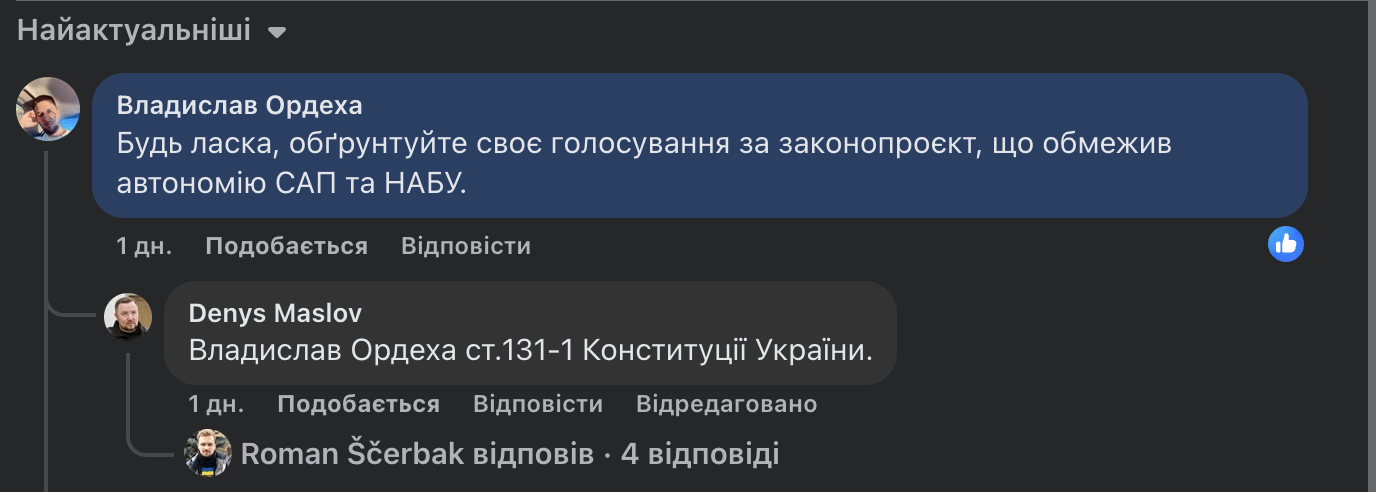
Translation:
“Vladyslav Ordekha:
Please justify your vote for the bill that limited the autonomy of SAPO and NABU.
Vladyslav Ordekha Art. 131-1 of the Constitution of Ukraine.”
In this context, the silence is telling—it may indicate an unwillingness to publicly defend a politically sensitive decision and suggests the vote was rushed, lacking both full parliamentary debate and prior communication with constituents.
What interests us more, however, is the public messaging from those who genuinely viewed the adoption of Bill No. 12414 as a victory—and brought their enthusiasm to the public sphere. Surprisingly, there were very few such voices. We examined the main narratives that MPs used in their extended commentary on why they supported Bill No. 12414 and identified several ideological patterns that underpin their positions.
The most commonly used narrative is the denial of any threat to the independence of anti-corruption institutions, framing the adopted changes as purely technical or procedural updates. A typical framing of such statements emphasizes that NABU and SAPO remain fully functional, and that the modifications pertain solely to procedural regulation of institutional accountability. This argument appears in nearly identical posts by MPs Ihor Fris and Ihor Marchuk. Both stress that “NABU and SAPO remain fully operational and independent in their work,” and that the law “does not revoke their powers, but merely sets clear procedures for interaction with the Prosecutor General’s Office.” Both lawmakers avoid mentioning the rehaul of the model of subordination or the institutional power balance, instead focusing on the procedural neutrality of the decision. Similar arguments were voiced by MP Larysa Bilozir, who directly referred to her colleagues’ posts. On her Facebook page, she noted: “NABU and SAPO have not been dissolved. The independence of the SAPO head—in place since January 1, 2024—has been removed, and he’s now subordinated to the Prosecutor General. But that’s how it was before, too […].” In doing so, she frames the situation as a “restoration of normalcy” rather than a restructuring of the institutional framework—thereby sidestepping any discussion about whether the change aligns with anti-corruption commitments.
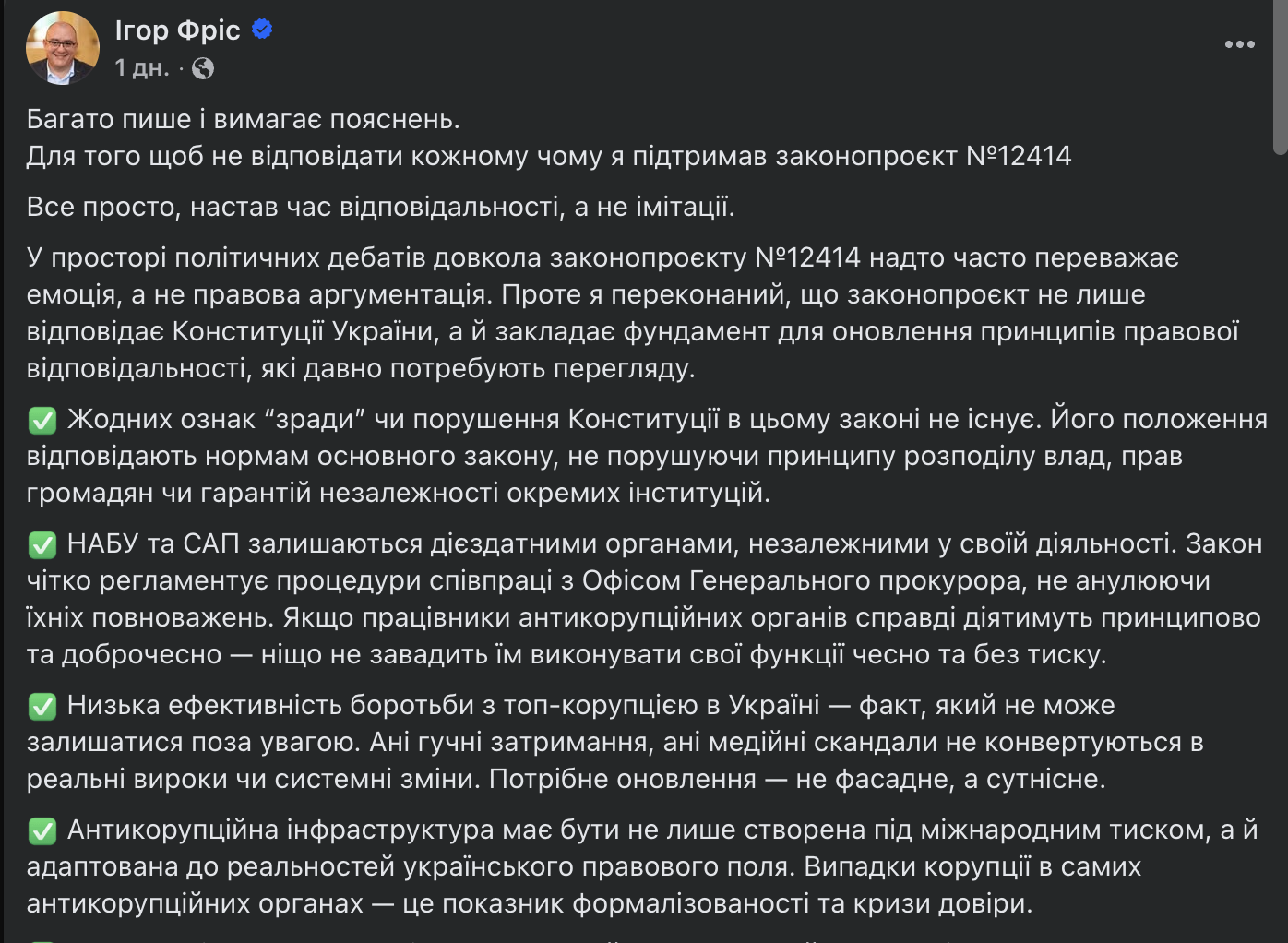
Translation:
“Ihor Fris
Many people are writing and demanding explanations.
So that I don’t have to respond to everyone about why I supported Bill No. 12414—
It’s simple: the time has come for responsibility, not imitation.
In the space of political debate around Bill No. 12414, emotion far too often prevails over legal argumentation. However, I am convinced that the bill not only complies with the Constitution of Ukraine but also lays the foundation for renewing the principles of legal accountability, which have long required revision.
*There are no signs of “betrayal” or violations of the Constitution in this law. Its provisions comply with the norms of the Constitution, without breaching the principle of separation of powers, citizens’ rights, or guarantees of institutional independence.
*NABU and SAPO remain functional institutions that are independent in their activities. The law clearly regulates procedures for cooperation with the Prosecutor General’s Office, without canceling their powers. If anti-corruption officials truly act with integrity and principle, nothing will prevent them from performing their duties honestly and without pressure.
*The low effectiveness in combating high-level corruption in Ukraine is a fact that cannot be ignored. Neither high-profile arrests nor media scandals are translating into real convictions or systemic change. Renewal is needed—not superficial, but fundamental.
*The anti-corruption infrastructure must not only be created under international pressure but also adapted to the realities of the Ukrainian legal system. Cases of corruption within the anti-corruption bodies themselves are a sign of formalism and a crisis of trust.”
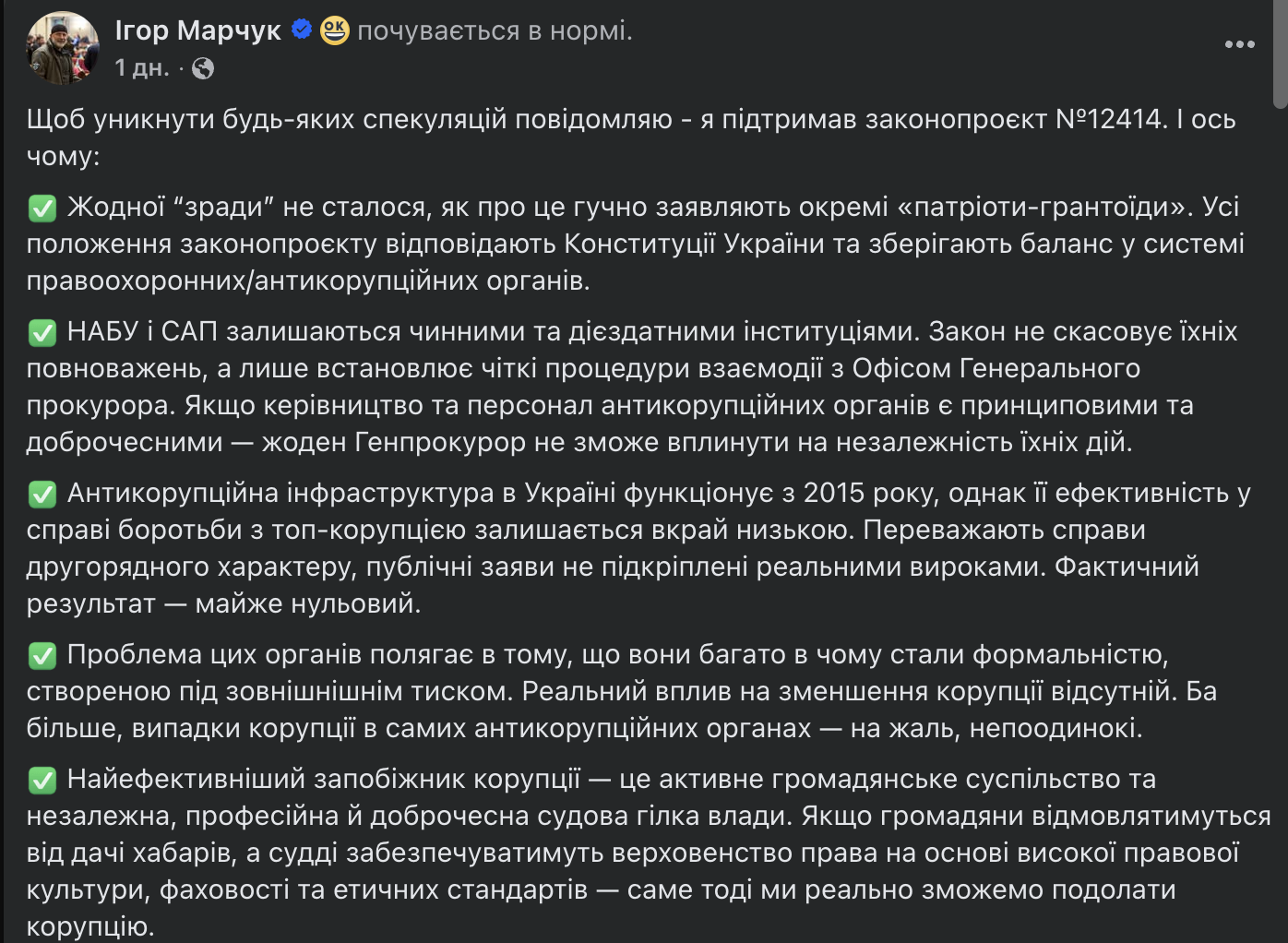
Translation:
“Ihor Marchuk
To avoid any speculation, I am stating clearly—I supported Bill No. 12414. And here is why:
*There was no “betrayal,” contrary to the loud claims made by certain “grant-eating patriots.” All provisions of the bill comply with the Constitution of Ukraine and preserve the balance within the law enforcement/anti-corruption system.
*NABU and SAPO remain active and capable institutions. The law does not revoke their powers but only establishes clear procedures for interaction with the Prosecutor General’s Office. If the leadership and personnel of the anti-corruption bodies are principled and act with integrity, no Prosecutor General will be able to influence the independence of their actions.
*Ukraine’s anti-corruption infrastructure has been operating since 2015, but its effectiveness in fighting top-level corruption remains extremely low. Most cases are of secondary importance, and public statements are not backed by real convictions. The actual result is nearly zero.
*The problem with these agencies is in the fact that they have largely become a formality, created under external pressure. They have no real impact on reducing corruption. Moreover, instances of corruption within the anti-corruption agencies themselves are, unfortunately, not rare.
*The most effective safeguard against corruption is an active civil society and an independent, professional, and ethical judiciary. If citizens stop offering bribes and judges uphold the rule of law based on a high legal culture, professionalism, and ethical standards—only then will we be able to truly overcome corruption.”
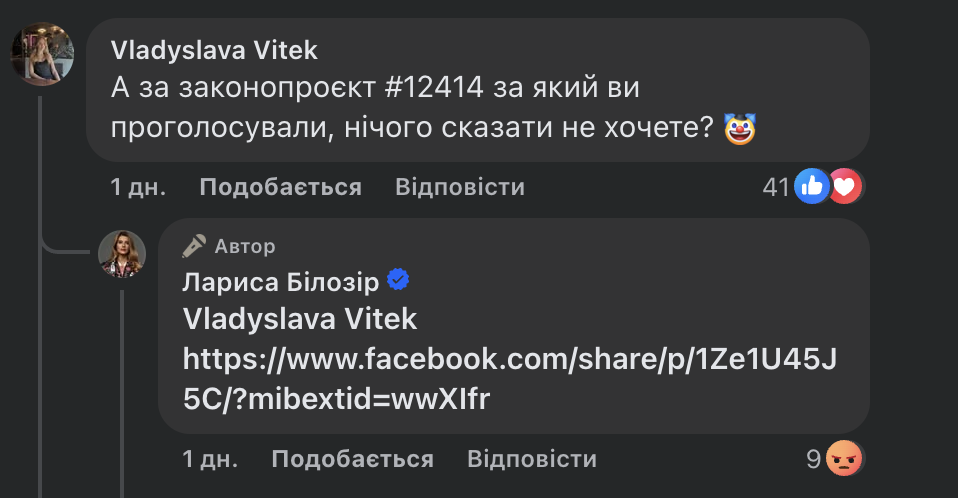
Translation:
“And about Bill No. 12414 that you voted for—don’t you have anything to say?
Larysa Bilozir:
https://www.facebook.com/share/p/1Ze1U45J5C/?mibextid=wwXlfr”
The next narrative is the assertion of the low effectiveness of anti-corruption agencies. It serves as a background justification for the need to change the system of accountability and oversight and is most often presented as a self-evident premise for legislative intervention. The argument centers on claims that the anti-corruption infrastructure has operated for a long time without tangible results, that it consumes excessive budget resources, and that there is a lack of accountability for failed or prolonged investigations.
In their posts, Ihor Marchuk and Ihor Fris frame this as an assessment of the entire system since 2015: “Ukraine’s anti-corruption infrastructure has been operating since 2015, but its effectiveness in combating high-level corruption remains extremely low. […] The actual result is nearly zero.” They add that “neither high-profile arrests nor media scandals translate into real convictions or systemic change.” This framing shifts the focus away from institutional changes and toward public disappointment with unmet expectations—implicitly legitimizing the attempt to dismantle the independence of these institutions.
MP Larysa Bilozir reinforces this theme by emphasizing the budgetary inefficiency of NABU and SAPO. In her post, she states that “billions of hryvnias have been invested in anti-corruption agencies, but the amount of corrupt funds returned to the budget is several times smaller.” In this way, the argument shifts to a rationale of cost-efficiency: the justification for reform is presented as an attempt to optimize public spending rather than a political decision.
The most emotionally charged version of this rhetoric appears in Oleksii Kucherenko‘s posts. He not only questions the effectiveness of the anti-corruption agencies but also directly accuses them of simulating activity. He refers to the “Rotterdam+” case and the investigation into Koboliev as a “soap bubble” and a “dud,” adding, “Nine years of pretending to investigate, and not a single result.”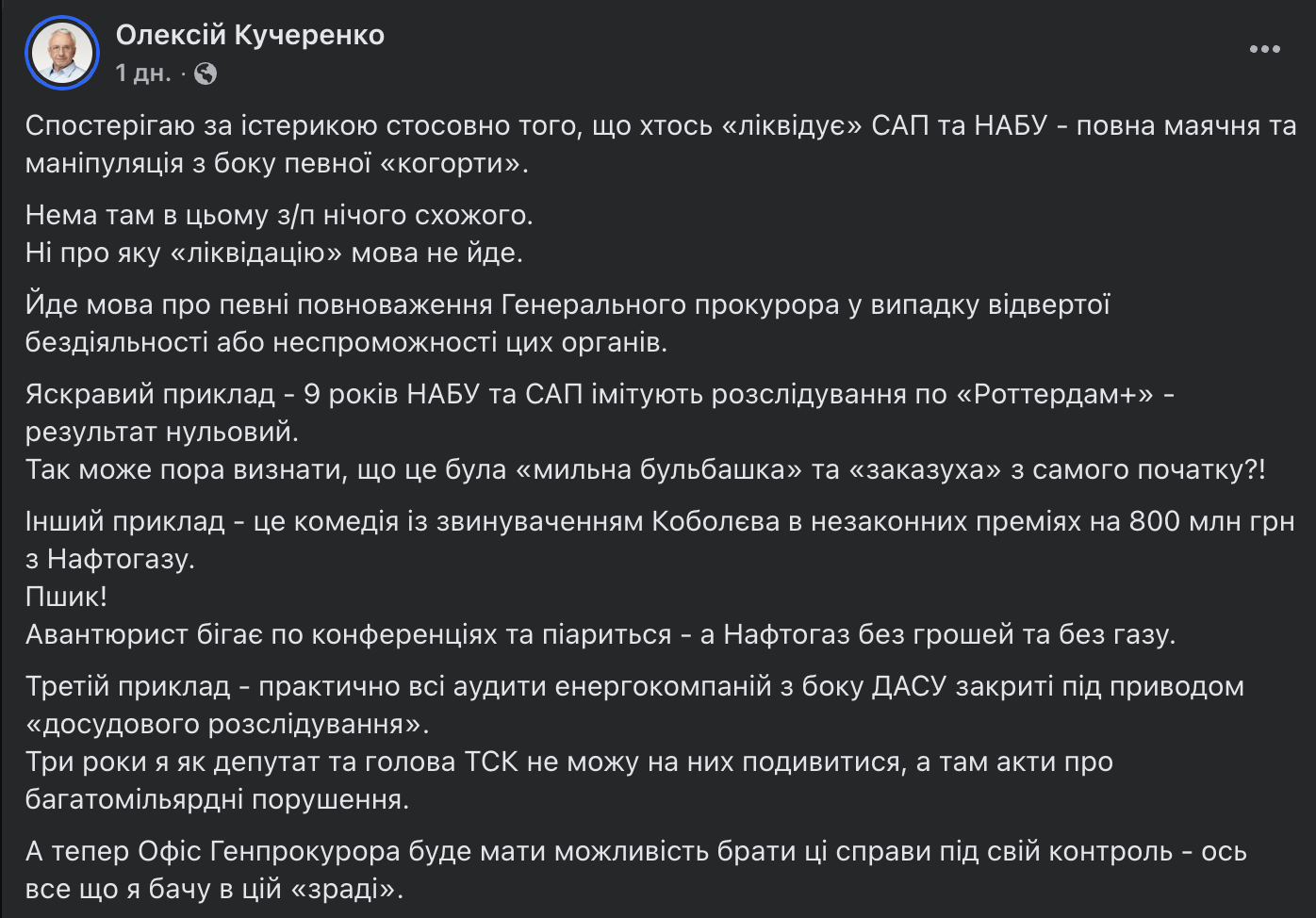
Translation:
“Oleksii Kucherenko
I’m watching the hysteria about someone “liquidating” SAPO and NABU—it’s complete nonsense and manipulation coming from a certain “cohort.”
There is nothing of the sort in this bill.
There is no talk of any “liquidation.”
What it’s actually about is certain powers of the Prosecutor General in cases of blatant inaction or incapacity of these bodies.
A vivid example—NABU and SAPO have been pretending to investigate “Rotterdam+” for nine years—the result is zero.
So maybe it’s time to admit that it was a “soap bubble” and a “planted op” from the get-go?!
Another example is the farce of accusing Koboliev of illegally receiving UAH 800 million in bonuses from Naftogaz.
A dud!
A schemer running around at conferences and promoting himself—while Naftogaz is left without money and without gas.
A third example—almost all audits of energy companies by the State Audit Service (SAS) are closed under the pretext of “pre-trial investigation.”
For three years, as an MP and head of the Temporary Investigative Commission, I haven’t been able to see them, and those reports show multibillion violations.
Now, the Prosecutor General’s Office will have the ability to take these cases under its control—that’s all I see in this so-called “betrayal.”
Some MPs went even further, congratulating the Ukrainian people on overthrowing one of the “pillars of colonial influence.” Yuliia Tymoshenko’s speech in the parliament was backed by MP Maksym Buzhanskyi, with similar themes echoed in posts by Maryana Bezuhla. Tymoshenko emphasized the “transfer of the constitutional rights of the Ukrainian people to foreigners,” referring to the involvement of foreign nationals in supervisory boards. Her line—“the colonization of Ukraine is no panacea”— echoed Bezuhla’s rhetoric, when she claimed that Ukraine had been “playing too long in the sandbox of ‘partner demands,’” and contrasted an “independent state” with the influence of “random Americans,” who, she argued, are in a position to question NABU staff. Buzhanskyi—who can hardly be described as anything but a controversial figure—did not bother explaining his position at all. His constituents got little more than jokes: some about Yuliia Tymoshenko’s weight class, others about MPs who voted against the bill.
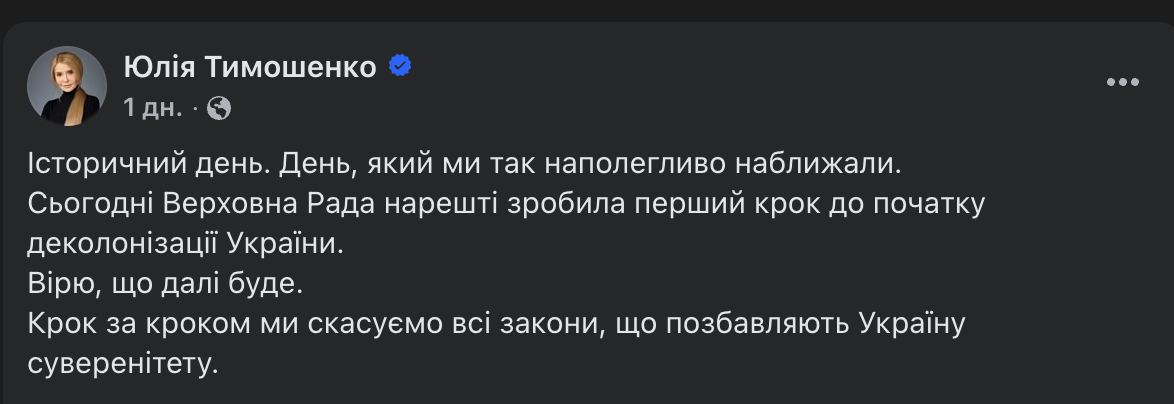
Translation:
“Yuliia Tymoshenko
A historic day—a day we have worked tirelessly to bring closer. Today, the Verkhovna Rada has finally taken the first step toward Ukraine’s decolonization.
I believe this is only the beginning.
Step by step, we will repeal every law that strips Ukraine of its sovereignty.”
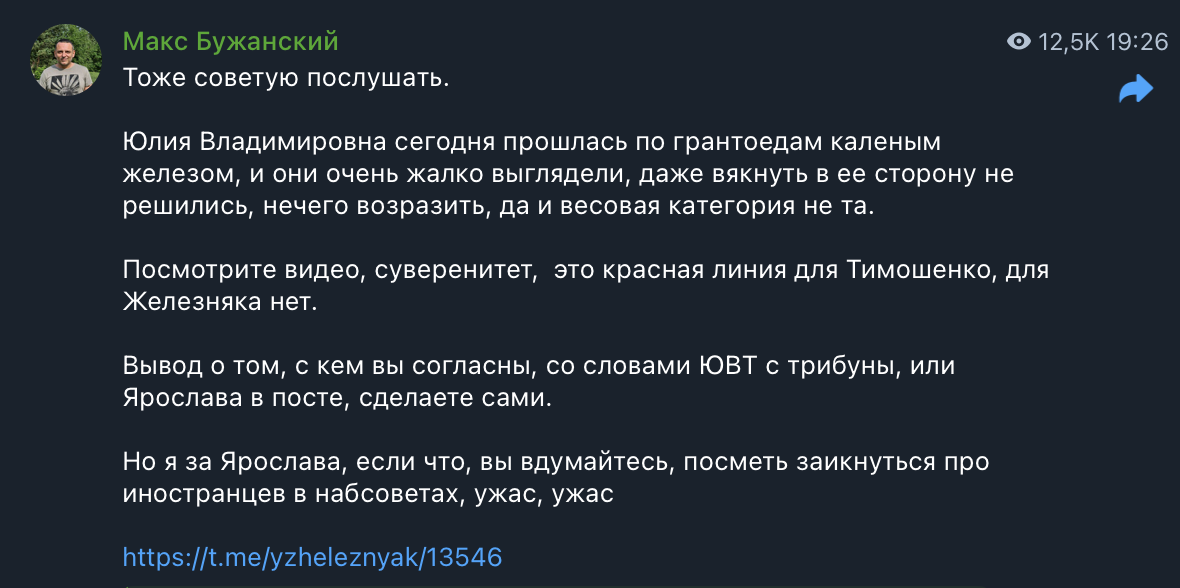
Translation:
“Maks Buzhanskyi
Yuliia Volodymyrivna scorched the grant-eaters today—and they looked pitiful, didn’t even dare squeak back at her, nothing to say, and not in the same weight class either.
Watch the video—sovereignty is a red line for Tymoshenko; for Zhelezniak, it isn’t.
You’ll draw your own conclusion about whom you agree with—Yuliia’s words from the podium or Yaroslav’s post.
But I’m with Yaroslav, just so you know. Think about it—daring to even mention foreigners on supervisory boards? Terrible, just terrible.”
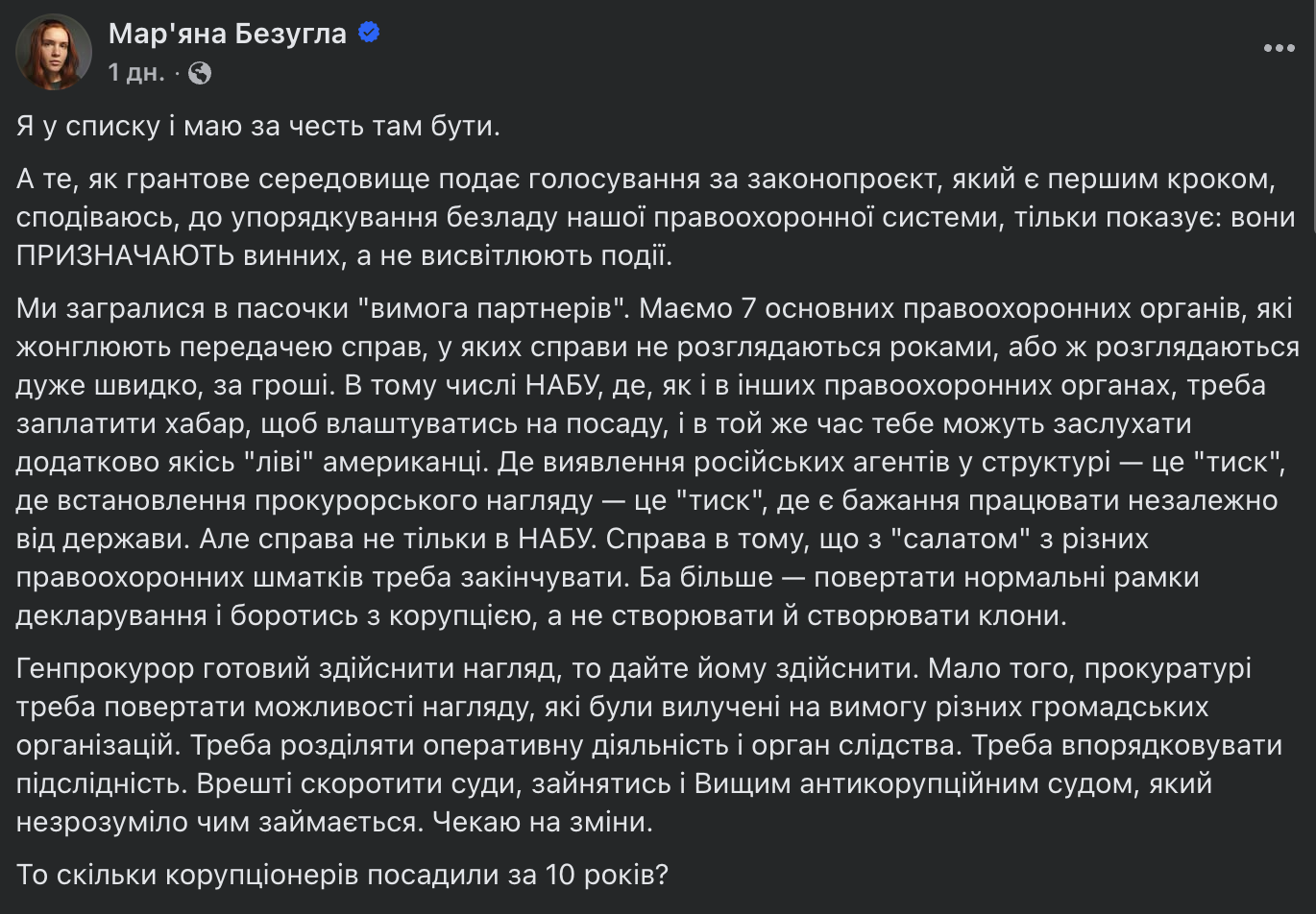
Translation:
“Maryana Bezuhla
I’m on the list and honored to be there.
And the way the grant-funded community presents the vote on the bill—which I hope is the first step toward putting some order into the chaos of our law enforcement system—only shows: they ASSIGN guilt, not report events.
We’ve been playing too long in the sandbox of “partner demands.” We have seven major law enforcement agencies juggling case transfers, where cases aren’t reviewed for years—or are handled very quickly, for money. Including NABU, where, just like in other law enforcement agencies, you have to pay a bribe to get a job, and at the same time, you might be summoned for an additional hearing by some “random” Americans. Where uncovering Russian agents inside the structure is labeled as “pressure,” where establishing prosecutorial oversight is labeled “pressure,” and where there’s a desire to operate independently of the state. But it’s not only about NABU. The issue is that we need to put an end to this “salad” of fragmented law enforcement pieces. What’s more, we must restore proper declaration rules and fight corruption instead of endlessly creating clones.
The Prosecutor General is ready to provide oversight, so let him. In fact, the prosecution needs to regain the oversight powers it lost at the demand of various civic organizations. We must separate operational activity from investigative bodies. We must organize jurisdiction. Finally, we need to reduce the number of courts and deal with the High Anti-Corruption Court, which seems to be doing who knows what. I’m waiting for changes.
So, how many corrupt officials have been jailed in the past 10 years?”
The MPs who dared to resist in what was clearly a losing battle were rewarded with labels like “grant patriots” and other terms linking them to participation in various support initiatives from Western organizations—despite no clear evidence that any of them had ever actually received grants or assistance from Western partners. Such labels were used by Tymoshenko and Buzhanskyi, as well as Bezuhla and MP Ihor Marchuk. In a lengthy Facebook post, Marchuk mentioned “grant-eaters,” yet just a few paragraphs later expressed high hopes for civil society. In the comments under his post, he was unable to explain the difference between these terms.
It is also worth noting that in their initial public communications, none of the MPs mentioned the infamous “Russian trace” in NABU, which had been brought up following searches conducted by the SBU.
Thus, the true reasons behind the decision remain unknown. A situation in which each MP cites their own arguments is functionally equivalent to a lack of any clear, rational justification that could be presented collectively by all those who pressed the green button.
The results of our analysis of parliamentary communications indicate a lack of comprehensive public justification for the adoption of Bill No. 12414 and a tendency among MPs to avoid clearly articulating their positions. This creates the impression that lawmakers are unwilling to engage in open discussion of sensitive decisions, which undermines public trust in parliamentarians and threatens the legitimacy of the decisions made. Those MPs who did comment publicly on their vote often used neutral rhetoric, presenting the changes as minor and purely technical. This suggests an effort to deflect public criticism by downplaying and oversimplifying the consequences of the adopted changes. Some public statements were marked by manipulative tactics, including vague references to “ineffectiveness,” “grant dependency,” and “foreign influence,” without supporting evidence or analytical substantiation. This signals an attempt to divert public attention from the substance of the decision to emotionally charged narratives. The use of labels such as “grant patriots” and rhetoric about “foreign influence” contributes to deeper political polarization in society, degrading the quality of public debate and impeding constructive discussion on reforms and anti-corruption policy.
MPs must regularly and clearly communicate their positions to voters on significant legislative changes—particularly when these involve sensitive reforms. It is not a novel recommendation to adopt the common democratic practice of publicly discussing key bills, with the involvement of relevant experts and the public, prior to their adoption. In both deliberations and subsequent public communication, manipulative tactics, unsubstantiated accusations, and emotionally charged labels should be avoided. Instead, the focus should be on facts, data analysis, and well-founded arguments. Lawmakers should be prepared to engage in open dialogue with the public and the expert community, respond constructively to criticism, and be ready to explain the decisions they make. This approach will help reduce the risk of a political crisis.
Photo: depositphotos.com/ua
Attention
The authors do not work for, consult to, own shares in or receive funding from any company or organization that would benefit from this article, and have no relevant affiliations





